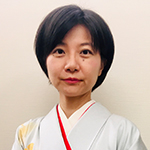Report on the 8th Japanese Speech Contest for Foreigners Engaged in Nursing or Long-term Care
2020.3.18
Isago Rina
International Operations Section I, Japanese-Language Dept. I, The Japan Foundation
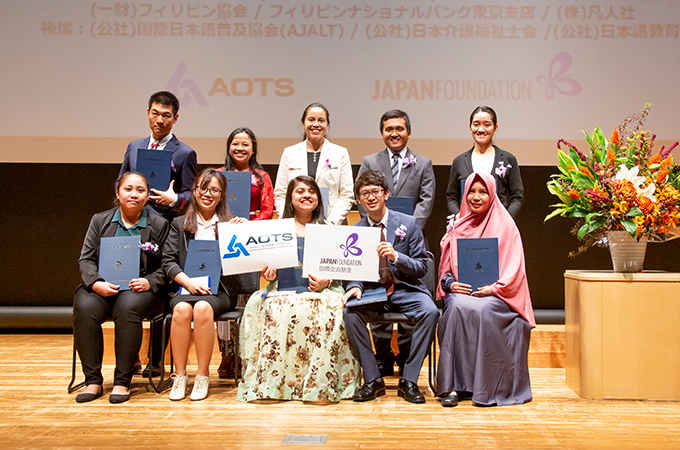
Prize winners and special prize winners
On November 2, 2019, the Japan Foundation co-hosted the 8th Japanese Speech Contest for Foreigners Engaged in Nursing or Long-term Care with the Association for Overseas Technical Cooperation and Sustainable Partnerships (AOTS). With a growing number of foreign-born nationals being accepted into Japan, this speech contest has been held annually since 2012 as a valuable opportunity to hear the experiences of non-Japanese people already working in the country. Speeches were delivered by 10 foreign nationals who passed the first-stage examination and are currently working at nursing or long-term care sites. They introduced daily anecdotes with patients and care receivers and offered recommendations to Japanese people.
Here are two of the winners' speeches.
First Place: "What I learned from working at a care facility"
Riska Rahmatika (Indonesia)
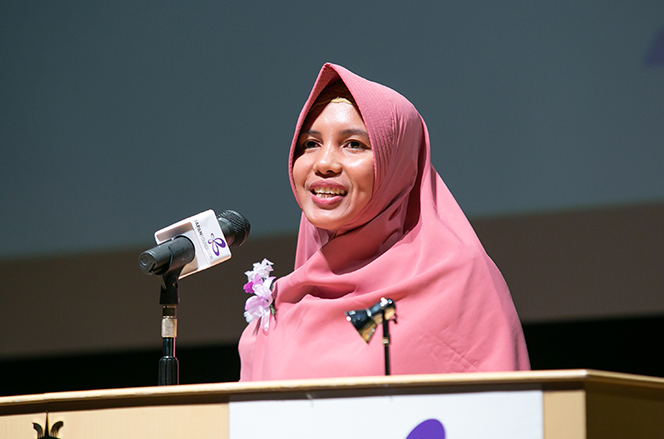
First-place winner Riska Rahmatika
Hello, everyone. My name is Riska and I'm a care worker candidate from Indonesia. I've been working at a health care facility in Aichi Prefecture since December 2018. Although it's been less than a year since I started working, I have many things I would like to tell you.
The first is what I learned from the staff. Before I started working, I was worried that Japanese staff might be very strict. I felt apprehensive about various matters as my Japanese was still not good and it would be difficult to study while working. However, once I started working, I found that staff members were kind, spoke slowly for me and taught me things over and over until I got them right. ... When staff asked, "Riska, ima te aiteru? (literally, 'are your hands available now?' meaning 'are you free now?')," they saw me clasp my hands together with an apprehensive expression. Then they rephrased the question, "Are you busy now?" and I was able to understand. ...
Second, I will talk about my interaction with care receivers. Whenever I come in contact with them, I always think that "they are my future self." When I get old, somebody will take care of me. I try to act by thinking what I would want if I was a care receiver. I would wish to be treated kindly, so I try to do the same for them. Once, when I was assisting a care receiver, I said, "Mr. X, let me help you stand up now," but he replied, "No, I want to stay in bed." I wondered what I should do next and said, "Oh, you want to stay in bed? Then I'll meet you in your dreams." Hearing this, Mr. X laughed and let me help him stand up, saying, "Well, I guess I'll get up then." I was confused at first but seeing his smile filled me with joy. ... Caring for care receivers taught me the importance of treating people kindly with a sense of humor and looking at the entire picture.
The third point is about calling out to others. Staff and care receivers often say, "Thank you" or "You really helped me." I really like to hear these words. Why? Because this makes me feel that I'm being useful to others. Also, staff I don't even know say "Good job" and this makes me happy, too. This also makes our relationship even better. The staff and care receivers also frequently say, "Excuse me," "Thank you," "I'm sorry to bother you again and again..." or "You've helped so many times." Even if they haven't done anything wrong, they will say "Sorry, sorry." They can immediately express words of appreciation and an apology. It's not really important who made a mistake or who you helped out. I think it's wonderful that everyone can immediately say these words on their own.
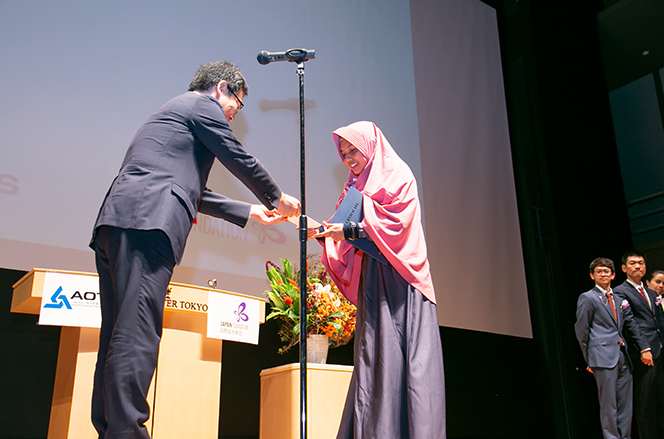
Riska Rahmatika receiving extra prize
Lastly, I would like to talk about religion. In Japan, nobody is late or takes time off for their prayers. But for me, my religion and whether I can pray and wear a hijab* are important. Whenever I pray during the middle of work, I devise ways to do so within the set time period. Sometimes the staff reminds me of the time to pray. Islam teaches us to "respect our parents and bring benefits to other humans" and "speak honorable words to and love the elderly." I value these teachings and wish to provide kind and sincere care.
Everyone, let's think about how we can work pleasantly every day. I think there is a lot to learn in Japan besides just about work.
*A hijab is a head scarf worn by women in Islamic regions.
Second Place "Spiritual Support"
Ni Luh Putu Widyaningsih (Indonesia)
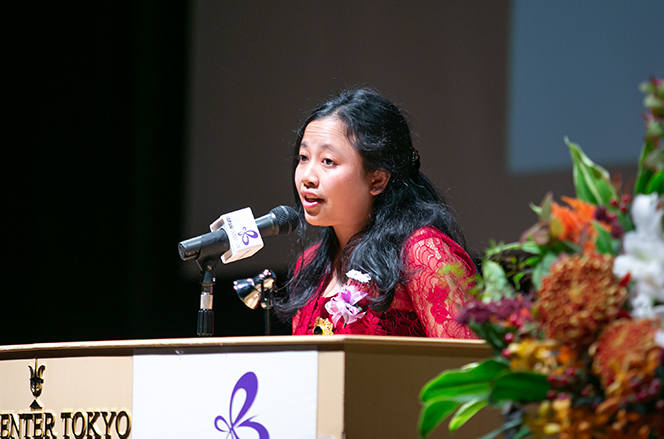
Second-place winner Ni Luh Putu Widyaningsih
... Around six months after I started working part-time at a nursing care facility, something happened that changed my thinking. That was the birthday of Yuki (not her real name). As usual, I was cleaning up the dishes after breakfast. I noticed something and asked a care receiver, "Do you know where Yuki is?" Someone said, "It looks like she's in her room."
What? That's odd, I thought to myself. She usually drinks tea while watching TV. That day, though, she immediately went back to her room. When I peeked through a half-opened door, I saw she had changed clothes. I asked, "Yuki, what are you doing?" and she replied, "Today's my birthday so I'm sure my family will come to visit me. I think I better get ready now." Hearing this made me happy, too.
Yuki then started telling me about her family. But even after lunch and dinner, her family didn't come.
I asked her softly, "Yuki, are you okay?" She replied, "I'm all right," but when I looked closely, I could tell she was crying. I went over to her right away and embraced her. As I comforted her and told her "It's okay. I'm here for you. Happy birthday," tears welled up in my eyes, too. Yuki responded, "Thank you for stopping by to cheer me up. No matter how busy you are, please take good care of your parents. This year, you were here for my birthday. Thank you."
I was deeply moved by this experience. Various thoughts raced through my mind about my own father and mother in Indonesia. I told her "Even when my parents become really old, I'll definitely take care of them. Thank you, Yuki. Today, I also received a present from you." Then we cried together.
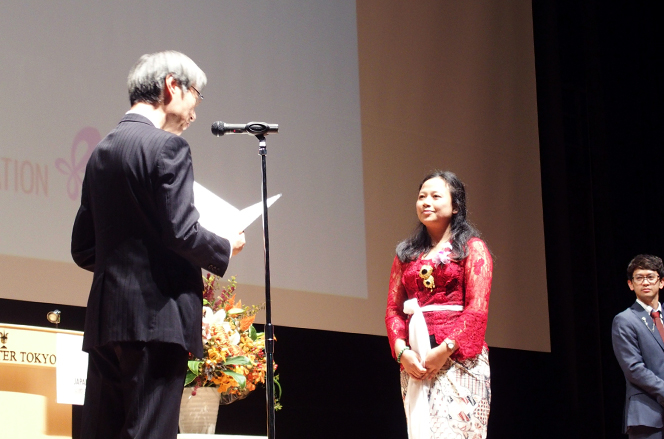
Ni Luh Putu Widyaningsih receiving the commendation
This experience made me realize that care receivers were in reality lonely and isolated. As they grew older, their lives gradually changed. Their physical strength diminished, they got sick and their friends and family members passed away. They may have children, but they are all busy and have no time to visit their parents.
That's probably why she found solace and comfort in me. As I listened to Yuki's stories, the desire to understand care receivers' feelings and provide them with strong spiritual support grew even more.
Ever since that day with Yuki, I always put my heart into my job and smile and laugh with care receivers even when I am facing my own difficulties.
Everyone, let's provide spiritual support so that care receivers don't become isolated.
Working in a foreign country using a foreign language is difficult enough. This is all the more so at the frontline of nursing/long-term care where human lives are involved. At first, they may run into a Japanese-language and dialect barrier, and are unable to communicate smoothly with care receivers and staff. There must be countless times when they shed tears because they miss their families so much and just want to go home.
However, they all have overcome difficulties by drawing on their own strengths. Today, they continue to perform their jobs with bright smiles on their faces. In listening to their speeches, I realized that it was also important for us Japanese to become a good companion for and listen to the voices of people from other countries.
Videos of everyone's speech are posted on the AOTS official website.
8th Japanese Speech Contest for Foreigners Engaged in Nursing or Long-term Care
https://www.aots.jp/about/publications/action/japanese-speech-contest/
Back Issues
- 2025.9.30 The 51st Japan Found…
- 2025.9.30 The Japan Foundation…
- 2025.9.30 Bringing the World C…
- 2025.9.30 The 51st (2024) Japa…
- 2025.9.30 Japan Foundation Pri…
- 2024.5.24 The 50th Japan Found…
- 2024.3. 4 Movie Theaters aroun…
- 2023.4.10 The 49th Japan Found…
- 2023.3.28 JF's Initiatives for…
- 2023.1.27 Living Together with…


